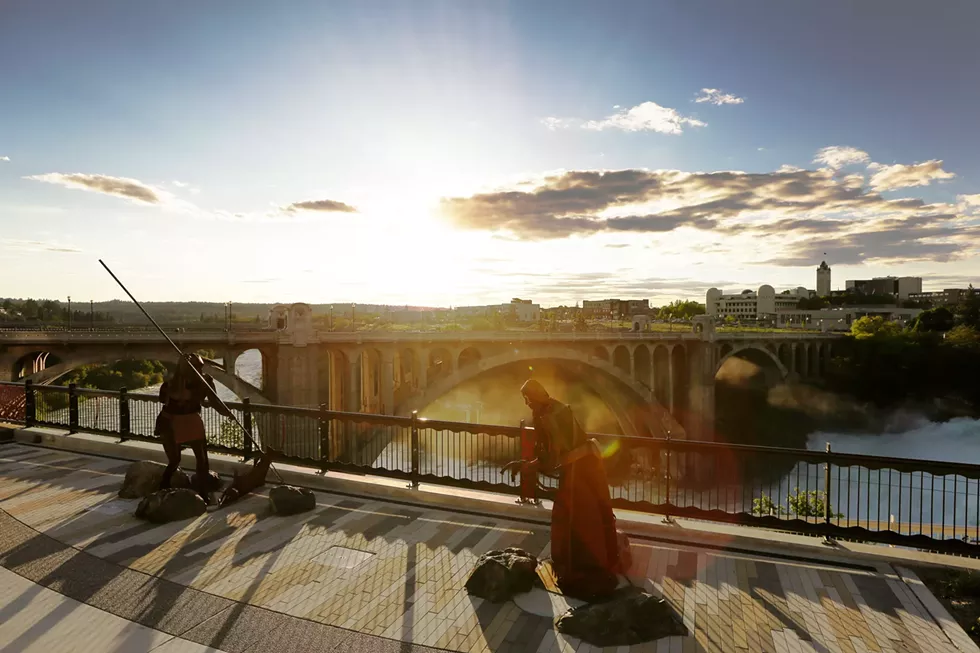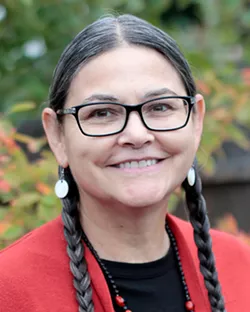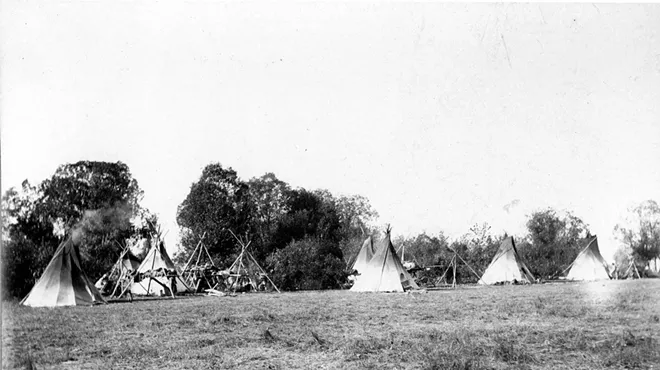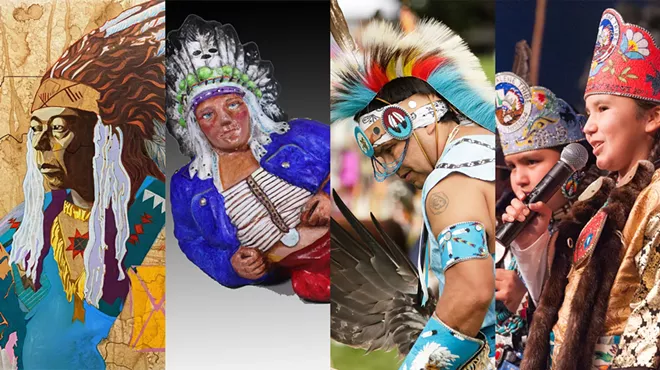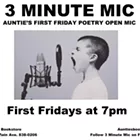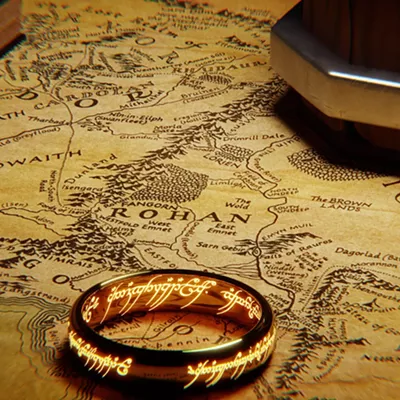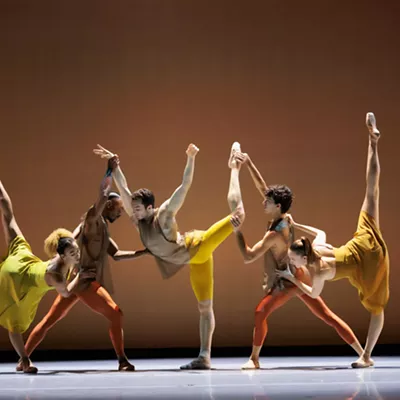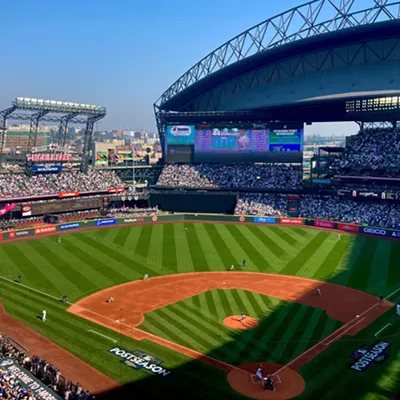Salish is the language of the Inland Northwest.
For thousands of years, since time immemorial, the language has been spoken by the various people of the Columbia Plateau — the Spokane, Kalispel, Colville, Coeur d'Alene and Moses/Columbian people.
The story of our region's tribes and Native people is too often told with shame and tragedy. Colonization and dehumanizing policies on behalf of people who came here from places far away. Attempted destruction of culture and language.
But there's something happening that's cause for celebration among all of us in the Inland Northwest. The language never died, despite efforts to extinguish it and the culture indigenous to this region. The continued resilience of Salish culture, and the hard work of many people, is returning the language to its central place, not just among Native people but in the Inland Northwest as a whole. We see it more and more. That's because we are l̓ es qʷomšúlexʷ, as you'd hear from speakers of Kalispel Salish. We are hec kʷumšúlexʷ, like you'd hear from those who speak Spokane Salish. We are čkʷum̓xúlaʔxʷ, as you'd hear in Colville Salish. We are Inlanders, people of the interior land.
In this issue, you'll hear from five people who are part of the Salish resurgence. They all grew up hearing the language, and now they're hearing it as it heads into the future. Listen to what they have to say.
Salish, it's really personal because it's the language of my family. It's a connection. It's a way to fill up my heart and gain strength. One of the great joys of my life is speaking Salish with my family, my grandkids and my kids.
I did an independent study one summer with Pauline Flett. I went out there and met with her, and I heard the language for the first time. It was strange. It hit me like a ton of bricks. It took the wind out of me, just to hear the language. For me, the language sounds like the land. The clicks, the rustling sounds — it was so beautiful. Some of the clicking sounds like when you're next to the river. With the runoff, you can hear the rocks moving, clicking together. There's this word ʔaʔísc̓k̓. That's the word for squirrel. The sound at the end sounds just like a squirrel. The word for magpie, ʕan̓n̓. It just sounds like the magpies out there. There are many words like that. I grew up out in the country and really connected to the land, and the language brings me there.
I want people to become passionate about learning the language. I'm hoping folks really grab on to it and take it home with them and speak it with their families. That's how we bring the language back. For me, so many things were taken from our people. Part of everyone's identity is language, religion and culture. So much was taken from our language, with our elders put into boarding schools, just a lot of destructive practices. Bringing the language back is healing. It's a piece of the puzzle so our people can heal. It's restoration. When you're missing a piece of you, you try and fill it with other things. For a lot of people that's drugs and alcohol, addiction. I want to fill people with language.
My hope is that we see people speaking Salish in their homes. And reconnect to the time before people were cut off from their language. I want to hear our language in the grocery store, when we're out shopping, and in our schools. Kids are so funny. When it really hits them is when we take our older students out into the community and they get to share the language with the larger community, to share who they are and be part of the community. That's when you really see them connect the dots.
For 10,000 years or more people were speaking Salish. There was a 200-year gap. When you look ahead, it will seem like a short amount of time, and we were able to overcome it. We will bring our language back. ♦
CAJ MATHESON
Director, Coeur d'Alene Tribe Natural Resources Department
The Coeur d'Alene language retains the vast majority of information related to our identity. It often describes the heart of the Coeur d'Alene people better than English and other languages. It describes the way we have viewed the natural world for thousands of years, our view of relationships with one another, and the values that make us distinct from all other people.
I'm sure I don't remember the first time I heard it being spoken. My earliest recollection of it expressly being taught to me was in third grade at the Coeur d'Alene Tribal School. At the time we had many fluent speakers so I don't remember anything extra special about it. In fact, I mostly remember all of us kids laughing when being taught words and phrases that had funny meanings in English, including swear words. Our teacher was an elder who is now passed on, Vinnie Felsman. She was a petite elder, and I can remember her laughing at her ability to be able to make us giggle (she never taught us swear words, that came from others).
I want, first and foremost, that the people of the Coeur d'Alene Nation prosper. I want them to feel confident in the identity given to them by our Creator and to ultimately have peace and the best chance toward success, however they define it. I also want them to carry on the values and knowledge embedded in our language to the next generations so we can always know how best to manage the earth here where we were placed.
The future is uncertain. Of course each of the interior Salish languages is in a different place. But, the future is uncertain. Like so much of the world around us we are in changing times, and it is becoming more and more difficult for people to carry this critical information forward. However, we will not stop doing all we can to carry the language forward and provide all the opportunity for our people to succeed. ♦
MARSHA WYNECOOP
Language Program Manager, Spokane Tribe of Indians
We're not only bringing back the language, we're bringing back the cultural knowledge that comes with the language. It's healing after the boarding school era to reclaim who we are and the deep cultural knowledge that we once had. That healing can only come through the revitalization of language and the teaching of the culture. One of the words is nek̓ʷul̓mn. The essence of who we are. The language and culture gives us a sense of self-worth and defines us.
The language and the culture were severed back in the boarding school era. We weren't allowed to speak our language or practice our traditional ways then. In order to reverse the harm done, we opened the nčéʔʔspʔus — Back to the Heart immersion school — about six years ago. Here the students learn the language and culture of our tribe once again. We have several young people who have gone through the school who have transferred and gone on to the local public school. We found that the students lag a little bit at first and then excel in school.
It started for me when I was about 7 years old. I was at my grandmother Mary Samuels Whalawitsa's place. Another grandmother, Daisy Moses, came down to visit her, and they were both speaking in the language. That was the first time I heard it spoke fluently. I thought it was the most beautiful thing I ever heard. I was mesmerized by it. I knew as a kid that's what I wanted to know, but I didn't know exactly how it would play out in my life. I have worked with many wonderfully dedicated people to help revitalize the language and culture throughout my 24 years as the language program manager. Like my grandmothers, the ones who continued to practice the language and cultural ways were very intelligent people and kind people.
I had four of my own grandchildren who attended the Back to the Heart language school. One day, I was in the kitchen, cooking, and they were all visiting at the table and all of sudden I heard them speaking the language together. It was very powerful, and remembering that moment can make me tear up.
We're trying to revive and revitalize the language and culture within the Spokane Tribal community. The students will have reclaimed who they were meant to be and their self-identity. My vision, we'd have a university here where people can get a Ph.D. in the language. That's the hope. Thanks to Pauline Flett, a Spokane Tribal Elder, we have an archive room full of her handwritten language documents she transcribed from audio recordings on reel-to-reel tapes of elders done in the late 1960s and early '70s. If the language is going to be saved, it's going to be saved through all of her hard work and dedication. ♦
JR BLUFF
Director of Language, Kalispel Tribe of Indians
For me, being a Kalispel tribal member, the language is the identity. Identity and a familiarity of the land. Our language is our connection to culture, to who we are, to where we come from. It is what we need to be successful in this world. Language has so many connections to the world. Language is the connection to the past world, the physical world, the spiritual world. All of that. It opens doors to things that maybe you didn't know you didn't have.
Words are strong. My grandmother, Annie Bluff, she used to speak. She'd come over and talk to my dad, and when she didn't want us to know what they were talking about, she'd talk in the language. My dad, he spoke. All my uncles spoke. It was there. At funerals, it was spoken by uncles. And that was it. Nowhere else. Now we're in schools. Now we're at work. I know grandma would be happy.
My parents raised me good. They were very traditional, cultural based. I knew my elders. I grew up with them. They saw me fail and succeed. They told me about the language. In today's world, our language is a big missing piece that could easily be forgotten. That's my job, bringing it out in front. I want everyone to talk. I want our stories, our solutions, in this language. It was good enough for our ancestors. I want to pass that on to my people. As a tribal people, we like to give, we like to help. We want to give with purpose. Help with heart. We truly want to pray with you. Language pulls us all together. Language comes not so much from the head, but from the heart. By speaking it, you're empowered to have that strength, that heart. It builds big-hearted people.
People say learning language is hard. I don't get that. Nothing's hard if you want to do it. Some people look at the mountain and say, "Nah, that's too far, I'm good down here." That's not how I'm put together. I've never been really great at stuff, so I have to work hard at it. I study for three hours, not two hours. I have to be all in or else I'm not doing it. Give yourself some credit. You can do it. That's the intrinsic strength.
In the future, I hope that we do not have to be teaching language, we're just speaking language. Simple as that. Whether we're out picking Camas, or we're helping each other, or we're laughing together, crying together, we're doing it in the language. That's what I see. Not teaching language. It's just there.
For us Kalispel people, we really feel we're backed in a corner. We have books. We have curriculum. We have four or five speakers. That's just today. In the future, what I see, they're speaking the language, they're teaching the kids the language. They're living, talking, laughing, praying in the language. It's not something they have to study. It's just alive. If we're living it, not learning it, it's growing itself. It's self-sustaining. That's the power of language. A good example is we pray. Fifteen years ago Francis (Culloyah, a Kalispel tribal elder) says, "OK, JR you're going to pray." I didn't know how to do that, but I just slammed it and a week later I had it. And we prayed. Now I have 50, 60, 70 kids that can pray in the language. It's nothing to them. And now they know what to do before we eat. What to do when we pick that first berry. We pray. We're really trying to shift this tide. The language is sleeping, it's wanting to be awakened. In a thousand years when we look back, it'll be a little blip. That's what I think. ♦
BARRY MOSES
Co-Founder, Spokane Language House
When I was still a boy, my father and I used to go to the Longhouse in Wellpinit for holiday dinners or perhaps funerals. I remember our old people used to speak the language to each other. At that time, I didn't understand them. I only felt their words in my heart.
I also dreamed that our dead relatives would talk to me in Indian. I still didn't understand, so I pledged myself to learn.
As I learned our language, I had several paths. I started and enrolled in a university course with Pauline Flett. I also went with my grandmother Norma McCrea and my uncle Pat Moses to traditional ceremonies. I also worked at the Kalispel Tribe for three years with JR Bluff, Johnny Arlee and Stan Bluff. I was fortunate to have many elders in the language.
From the language I found out how we are tied to our ancestors, also how we are closely related to the land, the water, the animals and everything that's alive. We belong with everyone and everything. We care for the land, and the land cares for us.
The language is truly our heart.
Recently, we established Spokane Language House. We hope to gain more than just a few words; rather, we intend to immerse our students in the Spokane language. In that way, our ways will never end, and we will remember our heart forever.
One time I heard my uncle say, "When we speak our language, our old people will look at us from above and cry tears of happiness. They'll say, 'There are still Indians on the land.'"
łuʔ púti čn ttwit, l̓ qe in lʔew ʔišé qe xʷuy łuʔ č̓ ʔusšnéłxʷ łuʔ n sčecuwé x̣ʷl̓ sč̓luxʷtn łuʔ n scpútʔe sx̣lx̣alt u x̣ʷa x̣ʷl̓ hec čšt̓ims łuʔ tmtmney. hec nłk̓ʷk̓ʷmistn łuʔ in p̓ip̓x̣ʷút išéʔ hec nqéʔelixʷcnm łuʔ hec qʷlqʷlstwéʔexʷ. łuʔ pišéʔ u tac nsúxʷneʔstn. čmiš ʔenwén łuʔ scʔawʔáws łuʔ n i spuʔús.
nexʷ čqey̓smn łuʔ qe stm̓mélis łuʔ ƛe č̓uw u qʷu nqéʔelixʷcnmis. púti ta či snsúxʷneʔ. kʷen̓t čn čt̓k̓ʷepncút hiqs yoʔnúnm.
łuʔ yoʔnún łuʔ qe nqʷlqʷeltn, tʔe k̓ʷinš łuʔ i sxʷuytn. čn čtax̣ʷlé u čn q̓iʔncút l̓ kʷtiʔsnm̓em̓éyeʔtn łuʔ l̓ pauline flett. nexʷ čšnten łuʔ in qéneʔ norma mccrea u łuʔ i smʔeł pat moses łuʔ l̓ snláq̓istn u sntrqmintn. nexʷ čn k̓ʷul̓m łuʔ č̓ qlispé st̓úlixʷs x̣ʷl̓ čaʔłlspéntč łuʔ l̓ jr bluff, johnny arlee, u stan bluff. čn lemmscút u čxʷeʔxʷʔít łuʔ in p̓ip̓x̣ʷút u qe nqélixʷcnm.
tl̓ nqʷlqʷeltn u mipnún lšeʔ u qec ʕacpéw̓s łuʔ l̓ qe šʔitncútn, nexʷ lšeʔ u qec čsx̣mew̓s łuʔ l̓ st̓úlixʷ, łuʔ l̓ sewłkʷ, łuʔ l̓ xʷixʷey̓úł, u łuʔ l̓ hecyáʕ̓ łuʔ hec xʷlxʷilt. qec nk̓ʷłnšey̓nwéxʷ łuʔ l̓ hecyáʕ̓. qec čšt̓stem łuʔ st̓úlixʷ u t st̓úlixʷ u qec čšt̓łuls.
ʔunéxʷ qe spuʔús łuʔ qe nqʷlqʷeltn.
t hi sic u qe t̓k̓ʷepntm łuʔ np̓oq̓inišcnéłxʷtn. qe nmusls ta čmiš qs łłúwet qaqs tixʷscʔawʔáw u pn̓ qe sčc̓ox̣ʷ łuʔ qeqs "nt̓k̓ʷetkʷm" łuʔ qe suxʷʔac̓x̣łq̓iʔmínm łuʔ l̓ snxʷméneʔ nqʷlqʷeltn. lšeʔ u tap snp̓ƛmus łuʔ qe nk̓ʷul̓mn. lšeʔ u qeqs nłk̓ʷk̓ʷmistm łuʔ qe spuʔús x̣ʷl̓ pentč.
t nk̓ʷuʔ séwneʔmn łuʔ i smʔeł u cúti, "n̓e qe nqélixʷcnm, m̓ qe ʔac̓x̣łlt t qe p̓ip̓x̣ʷút tl̓ nwist. m̓ čawawpús tl̓ snpiyélstn. m̓ cúti: 'púti ep sqélixʷ łuʔ n st̓úlixʷ. ♦

